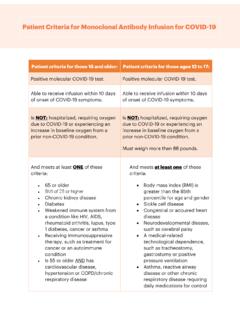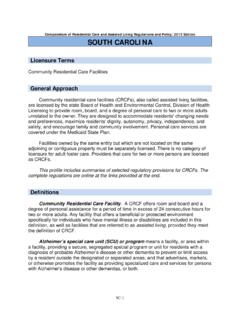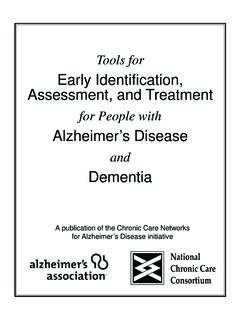Transcription of Understanding and Caring for the Person with Dementia
1 1 Understanding and Caring for the Person with DementiaA Practical Guide for Caregivers2 SIXTY PLUS SERVICESS ixty Plus Services provides support, education and evaluation to enhance the well-being of older adults and their families. Piedmont Atlanta Hospital established this program in 1987 to address the unique needs of geriatric patients and their family caregivers. Piedmont continues to recognize the importance of providing comprehensive geriatric services and support for the community. Services include: Aging Information Helpline Caregiver Resources Comprehensive Geriatric Social Work Dementia Support, Education, and Evaluation Program Guidance Through the Insurance Maze Care Transitions 3 TABLE OF Disease Caregiving Tips and Daily Understanding and Managing How Dementia Impacts the Caring for the Legal and Financial and Transition Back 32 End-of-Life 34 Spiritual Back Cover4 INTRODUCTIONU nderstanding and Caring for the Person with Dementia : A Practical Guide for Caregivers is written primarily for family members Caring for a loved one.
2 It is also useful for training staff and volunteers who provide care in nursing homes, hospitals, adult day centers, assisted living facilities and private homes. The basic caregiving techniques are similar, regardless of the has been gathered from many sources, including current publications, websites, lectures and seminars, and real-life caregiving experiences. The guide is comprehensive and includes practical tips to help in the day-to-day care of the Person with the first chapter provides definitions and an overview of Dementia . While most older adults with Dementia have the Alzheimer s type, others have Dementia from different causes. This chapter also describes the stages of Dementia , along with suggestions for working with 2 offers practical caregiving tips including suggestions for communicating with the per-son with Dementia . Chapters 3 and 4 focus on daily activities and managing behavioral 5 addresses the impact of Dementia on the family and provides information to help caregivers cope with the emotional issues they may face.
3 Chapter 6 discusses the importance of Caring for the and financial issues are covered in Chapter 7. Chapter 8 explains what can happen during hospitalization, and the importance of having a good discharge plan back to the guide concludes with information about end-of-life care and spiritual care in Chapters 9 and OVERVIEW What Is Dementia ? Dementia is a syndrome characterized by a gradual onset and continuing decline in a previously alert Person , resulting in impaired ability to perform daily activities. The decline most often affects memory and at least one of the following domains of cognitive func-tion: language, perception, vision and space perception, calculation, judgment, abstrac-tion and problem solving. Caring for some-one with Dementia requires flexibility, prob-lem solving, some trial and error, and a great amount of creativity and Cognition Refers to mental processes like thinking, Understanding , remember-ing, judging and problem solving.
4 Cog-nitive decline suggests an impairment in any of these processes. Memory loss or forgetfulness Many peo-ple experience some mild memory prob-lems or forgetfulness, having temporary difficulty recalling someone s name or where an item was left. This often occurs with normal aging. The memory lapse is brief, and the information can usually be recalled. This kind of forgetfulness does not worsen over time and does not serious-ly interfere with daily functioning. The vast majority of older adults retain their ability to learn, remember and solve problems. Problems with memory can have many causes, including infection, reaction to medications, depression and vitamin de-ficiency. Profound memory loss is never a normal part of aging. Mild cognitive impairment This is a distinct medical condition which causes problems learning new material, trouble recalling previously learned information and increased incidence of forgetful-ness.
5 People with mild cognitive impair-ment do not necessarily develop Alzhei-mer s disease, but they are at increased risk for it. Dementia This is an umbrella term refer-ring to the loss of intellectual function and progressive cognitive decline. There are many different causes. Some dementias are reversible; most are not (see list below). Senility An obsolete term used to de-scribe mental weakness associated with old age. This term is no longer used and has no medical Causes of Progressive Dementia Alzheimer s disease This is the most common cause of Dementia . It is char-acterized by tangles and plaques in the brain. It cannot be diagnosed with cer-tainty until autopsy, but the presentation of symptoms follow a typical pattern, leading to the diagnosis. Memory loss is the most common feature; behavioral changes cover a broad spectrum, from apathy and social withdrawal to paranoia, combativeness and extreme agitation.
6 Vascular Dementia Also known as multi-in-farct Dementia , this disease is caused by the blockage or narrowing of the arteries, or stroke, which results in the interruption of blood flow to the brain. Usually the onset is abrupt, with a step-wise decline. History of stroke or Transient Ischemia Attack (TIA), a temporary decrease in blood supply to the brain, is Parkinson s disease Many people with Parkinson s will never get Dementia , but some will develop it in the later stages of the disease. The primary symptom of Parkin-son s disease is impaired motor function. Lewy Body Dementia This condition is characterized by cognitive decline as well as motor impairments which resemble those present in Parkinson s disease. Lewy Body Dementia is caused by widespread protein deposits in deteriorating nerve cells in the brain. Early symptoms tend to fluctuate, but the Dementia progresses rapidly. Hallucina-tions, delusions and paranoia are common.
7 Frontotemporal Dementia Also known as frontotemporal lobar degeneration, this diagnosis represents a group of diseases that affect the frontal and temporal lobes of the brain. Onset is often under age 65. Changes in mood and behavior are more pronounced than memory loss. Aids Dementia complex A rapidly pro-gressing form of Dementia which typically occurs after years of HIV infection. Normal pressure hydrocephalus This is a type of fluid on the brain which can result in abnormal gait, incontinence and memory loss. However, if there is early di-agnosis and treatment, these symptoms can be reversed. Chronic Traumatic Encephalopathy (CTE) Associated with repeated head trauma, often due to athletic injuries, this type of de-mentia has only recently been identified as a distinct disease. Symptoms can include depression, memory loss, and aggression. Alcohol related Dementia Long term, excessive use of alcohol can affect the brain as a neurotoxin.
8 Mental confusion and memory loss are the most pronounced symptoms. Mixed type Dementia It s possible to have multiple causes of Dementia at the same time. Brain autopsies of demented patients show that many have evidence of multiple causes, such as Alzheimer s, vas-cular Dementia and Lewy Body of DementiaWith so many causes of Dementia , the first step is to have an evaluation and diagnosis by a physician. Basically, diagnosis of Dementia is made by: The exclusion of other medical problems, and The presence of progressively worsening memory, judgment and cognitive diagnostic process usually includes a thorough medical and neurological evalu-ation. Internists will often assess and diag-nose, but family caregivers may wish to have a specialist physician take on this role. Geriat-ric psychiatrists and neurologists commonly see many demented patients. In addition, the patient can be seen for extensive testing by a neuropsychologist who will then work with medical doctors to decide upon the most ap-propriate there is no laboratory test to diag-nose Alzheimer s disease, but with other types of Dementia existing tests are more conclusive.
9 Frequently, family caregivers are questioned at length about the behavioral changes they have observed before the diagnosis is the diagnosing physician will give the news to the patient. This should be done in the presence of family members and take into account the stage of Dementia of the pa-tient as well as the individual s personality. The explanation of the disease should match 7the Person s current ability to understand new information. When presenting this in-formation, simple and non-threatening lan-guage should be used, and the focus should be on the Person s areas of competence, rather than Dementia diagnosis can be very difficult for family caregivers. They may experience a sense of mourning and grief, similar to news of a death. But they need this information as soon as possible so that they can begin to plan for the follow-up with the Person s physi-cian is important for health maintenance and treatment supervision.
10 The physician can help the patient and family adjust to chang-ing behaviors and learn about what to an-ticipate as the disease progresses. Geriatric social workers at Sixty Plus can also provide education and of DementiaThe symptoms displayed with progressive Dementia may vary in severity and order of appearance. There is a fluctuation of abilities for the Person with Dementia , of-ten depending upon the time of day. Some days will seem much better, making family caregivers wonder if the diagnosis is correct only to be followed by days in which the Person is much people with Dementia will generally decline over time, passing through the following stages: Early/mild Dementia In the beginning there is a slow functional decline result-ing in problems with recent memory, judgment, reasoning, planning and minor problems in conversation. People in this stage are unable to organize or plan for future events regarding household mainte-nance, cooking, money management, fill-ing prescriptions and using the telephone.

















